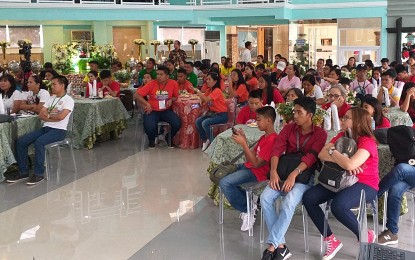
EDUCATING THE YOUTH. Students from different parts of Eastern Visayas join the Population Development Quiz in Tanauan, Leyte on Thursday (Nov. 14, 2019). The government underscored the importance of integrating sexuality education in lessons and activities in schools to curb the incidences of teenage pregnancy, population growth, and sexual diseases. (PNA photo by Sarwell Meniano)
TANAUAN, Leyte -- The Commission on Population and Development (PopCom) has partnered with the Department of Education (DepEd) in empowering students through sexuality education and adolescent health and development.
PopCom Eastern Visayas Regional Director Elnora Puma said in an interview Thursday the youth must be given quality information and services to realize their roles in the national development and potentials as a catalyst for change.
Both agencies have underscored the importance of integrating sexuality education in lessons and activities in schools to curb the incidences of teenage pregnancy, population growth, and sexual diseases.
DepEd Region 8 education program supervisor Rose Guino said sexuality education is already integrated into their various subjects as early as Grade 4.
“We are teaching students reproductive health and adolescence. It is already part of the curriculum using the mother tongue for them to better understand the concept,” she added in a separate interview.
According to PopCom's explanation of sexuality education, it is a curriculum-based process of teaching about the cognitive, emotional, physical, and social aspects of sexuality. It intends to impart age-appropriate and medically accurate information to equip the learners with knowledge, skills, attitudes, and values that will empower them to realize their health, well-being, and dignity.
Based on the 2015 census of population by the Philippines Statistics Authority (PSA), the percentage share of young people has remained stable at 20 percent. That comprised about 20.1 million, where half of which are adolescents at 15 to 19 years old sailing to adulthood in the next few years.
Moreover, in the 2017 National Demographic and Health Survey by PSA, 9 percent of women 15 to 19 years old have begun childbearing. Among them, 7 percent have had a live birth and the remaining 2 percent were pregnant.
These numbers were attributed to lack of awareness and proper education among young people, the study noted. PopCom also highlighted the big impact of poverty, forcing some children to be out of school.
Together with DepEd, programs, projects, and activities will be implemented upholding the promotion of adolescent health and development by educating these children with comprehensive and appropriate information.
Along with other local program partners, the two agencies have been active in addressing prevalent youth-related sexuality issues through advocacy campaigns and the creation of school-based teen centers.
Through its partnership with PopCom, DepEd has incorporated population and development related activities in this week’s festival of talents hosted by this town on November 11 to 15. This includes quiz bee, debate, poster-making, and jingle writing and singing.
The festival of talent is an annual activity of DepEd launched in 2012. It allows public school students to showcase their skills and talents in technical-vocation and arts. (PNA)
